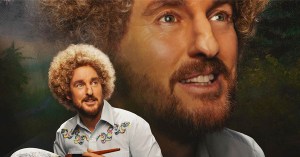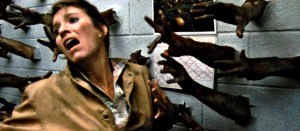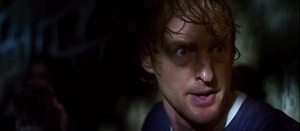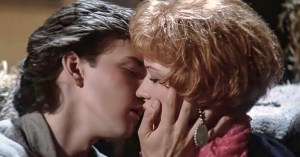Interview: Kathleen Hanna on The Punk Singer, Sexism, Riot Grrrl and More
The feminist rock icon talks about her career, the movies that influenced her, and the new documentary about her life.
Though she’d probably hate to admit it, Kathleen Hanna is a punk rock icon. As one of the founding members of Bikini Kill, Hanna was at the epicenter of the ’90s “riot grrrl” movement and a key music figure in radical feminism, a role she carried on into her dance pop outfit Le Tigre and her new band, The Julie Ruin. Along the way she’s inspired countless female (and male) musicians, gotten infamously punched by Courtney Love, and coined the phrase “Smells like teen spirit” (the latter incidents are unrelated, as far as we know.) She’s also one of the coolest (and nicest) people you could talk to.
Hanna is the subject of Sini Anderson’s new documentary The Punk Singer, a biopic of sorts that charts the singer’s rise from performance art through punk rock and beyond, and doubles as a mini-history of the riot grrrl era. Featuring interviews with the likes of Joan Jett, Kim Gordon, Carrie Brownstein and Hanna’s partner, Adam Horowitz, the movie offers an intimate portrait of the musician, and allows Hanna herself to speak frankly about her life and her recent battle with an undiagnosed case of Lyme disease.
Here, Hanna chats about the movies that inspired her, sexism in media, reconciling the past, the future of riot grrrl and more.
I was hoping we could start by talking a little about movies. We’re always asking about people’s favorite films and I’m really curious as to some of yours, or perhaps some of the ones that were influential on you.
Kathleen Hanna: Well, a really big movie for Bikini Kill was Ladies and Gentlemen, the Fabulous Stains, starring Diane Lane and Laura Dern. They’re in a punk band called The Fabulous Stains, and there’s members of The Clash that play kind of the rival boy band, called The Professionals. [Laughs] And their song is [sings] “We’re the pro-fess-ionals! Join the pro-fess-ionals!” It’s actually really good. I don’t know if you’ve seen that movie.
Oh, I’ve seen it many times. Which version of “Professionals” do you prefer? ‘Cause there’s that one over the end credits where they’re all dolled up to do the MTV-style version.
[Laughs] I like all of them! I like both of them. That was the thing about it. It was kind of interesting because it was kind of like what happened to Madonna — you know, with everybody copying how she dressed and showing up at her concerts. And it was also talking about this commercialization of things, and kind of going in the direction that the ’90s would go in — like, “You’re a sellout” and all that kind of stuff. I didn’t really realize that at the time. I mean, in high school we would say stuff like, “Oh, they’re sellouts now” and we didn’t really know what that meant. [Laughs] You know what I mean? It was like, “This band’s first EP was so great, but then everybody got into them,” and because everybody got into them that made them sellouts. Which is completely some random high-school way of thinking about things. But I remember that being the first film that I heard the term “sellout,” and I saw this feminist band being like, “Well we don’t care of you call us that — we’re gonna do whatever we want.” And that was a really powerful message for me and [Bikini Kill band members] Kathi [Wilcox] and Tobi [Vail], who were watching it on laser disc at Tobi’s parents’ house.
It has such an interesting history that movie, too, with the writer Nancy Dowd having her name taken off it ’cause she was worried about the final product. It’s odd how her original intent survives in the movie, even though it was directed by a guy and mishandled by the studio.
Yeah. Things like that always happen. I mean, films are such long processes that all kinds of weird sh-t happens during them that are too complicated to go in to. I kind of understand that world a little bit more now, and how things can go kind of wonky.
So Stains was a big one for you. Were there any other films that made an impact?
Definitely Born in Flames by Lizzie Borden. That was huge for me — like, monstrously huge. Oh, and the movie Working Girls that she made — not the Melanie Griffith one. It’s about sex work. I don’t know if you’ve seen that one.
No, I haven’t seen that one.
It’s just as amazing in a totally different way. It basically shows this woman who seems like a high-price call girl who works out of a fancy apartment, and her job is really boring. The whole movie is really boring. And I sat there laughing and loving how really boring it was, because I’ve been a stripper and I’ve been asked about it a lot. People would say, “Oh, you were a sex-positive stripper,” and I was like, “It doesn’t have anything to do with sex, to me.” It’s really boring and pathetic and embarrassing to everyone, and I don’t think that it’s sex-positive to be a stripper. I think of it as a way to, you know, put food in your mouth and be an artist and pay for college. I didn’t ever think that I was doing this sex-positive thing. [Laughs] So, watching this movie that was about sex work that was really boring was awesome, and I laughed through the whole thing. I was so happy.
Because it was so accurate in depicting the boredom?
Yeah! I would always joke, like, “Have you seen Pretty Woman, that documentary about prostitution?”
[Laughs]
You know what I mean? Movies like that. The mainstream public is supposed to believe that prostitution is like that.
That’s an interesting choice. I’ll have to see it.
Have you seen Out of the Blue?
Yes, the Dennis Hopper movie with Linda Manz? Love that.
It’s pretty amazing.
Okay, well I have to ask you this, because I’m an idiot. What is your take on Cassavetes? Do you have a favorite?
[Laughs] I would have to say say A Woman Under the Influence. That’s the one where the dog pops in. [Laughs] You know what I mean? In that scene where they’re in the living room and the German Shepherd just shows up?
That’s a really odd, specific detail to remember.
Yeah, I always thought that was so genius. Because it was just like, it said, “I know this is a film.” And it was playful.
I’m with you on the movie. Gena Rowlands’ performance in that film is just something else altogether.
Yeah. She’s out of control. She’s totally so good. So good. I mean, I also love her in Gloria.
Okay, staying with movies for a moment. You’ve had a long history, with both Bikini Kill and Le Tigre, of fighting sexism in the rock world. Do you have any thoughts on sexism as an issue in film? Is there any correlation between the music and movie industries, in terms of what girl bands and actresses have to deal with?
Yeah, I think definitely for actresses the big thing is weight. You’ve either gotta be rail-thin or, you know, you’re Rebel Wilson — you’re bigger and that’s how you’re sold.
There’s no in-between?
Right. It’s like, you’re just supposed to be extremely tiny and extremely good-looking, and you’re supposed to be 20 forever — all that kind of stuff. I think that’s similar. The thing about music is that it’s like flash-in-the-pan style — something will be really popular for like five minutes and then everybody forgets about it. It’s like, that person, in the mind of everybody, is gone. But they’re not gone, they’re still out there and making work; it’s just not being recognized or noticed. In terms of sexism in film, I’m sure it’s really just more of the same. You know, dealing with asshole male technical people who wanna make you feel like an idiot, and all that kind of stuff. I mean, look at how few female directors there are — in comparison.
Which is weird when you consider that in the early days of cinema, women were a major force in directing and writing movies. People like Alice Guy, who kind of made the first narrative movie. Why do you think there are so few now?
I think it’s sexism. You know, movies are a traditionally male field; I don’t know — I can’t explain it beyond that.
There’s that old saying that the history of cinema is tied up in the male gaze, that of men photographing women.
[Laughs] Yeah, that’s a great saying.
There’s also a different standard, I think, by which female filmmakers are assessed. For example, it’s rare that anyone ever talks about Sofia Coppola without invoking her “privilege,” as though she couldn’t possess her own talent, irrespective of her father.
Yeah, I mean, I think that happens all the time. I’ve done so many interviews where all they want to talk about is, you know, my husband, and my relationship with my husband [Hanna is married to musician Adam Horowitz]. And I opened that Pandora’s box in the film, so I understand it being a question, or two questions, but I don’t understand people who spend their entire 20 minutes with me talking about the Beastie Boys, you know? [Laughs] I’m like, “You do know that the film’s about me, and it’s called The Punk Singer?” [Laughs] So there’s always the thing where it’s just about the woman’s personal life; it’s never about her art. And they’re gonna give out that kind of criticism, no matter what. It’s not just. It’s like, a lot of men can get away with a ton of sh-t — a lot of white, straight men can get away with a ton of sh-t — and if a woman makes one mistake, it’s wallpapered all over the city. It’s hard to live like that. It’s hard to live feeling like one slip of the tongue and you’re over, whereas men can get away with just about anything. You know, if you say “F-ck you” to the wrong person and you’re a woman, you might be out of work forever — whereas men are expected to say “F-ck you” to each other. [Laughs]
Right. And I see so many interviews with you where people are like, “What do you think of Lady Gaga?” “What about Miley?” And the intent feels like “Let’s get a bitchy quote” and sort of play everyone off against each other.
Uh-huh. But you know, I know what they’re doing. It’s not like I don’t know what they’re doing — and I use it to my benefit. I also use it to keep the conversation about feminism in public going, because I think it is okay that we comment on each others’ work; I think it’s okay that, you know, I say I don’t appreciate it when women — or men — bandy about these stupid stereotypes about feminism that are age-old, and that are meant to keep people turned off from it. It’s like, “All you have to do is Wikipedia feminism to know that it’s not about man-hating — so shut up.” That makes me annoyed. And if I say that, then so be it. If people turn something into pull-quotes where I hate some female journalist or some other female musician, you know — I don’t hate any other musicians. But — I don’t like every other musician’s work. The same way that filmmakers don’t like every other filmmakers’ work. Just because I’m a feminist doesn’t mean I’m gonna say that I like every other woman’s work, or that I appreciate another statement that another woman publicly made. But I also understand that we all say stuff that’s stupid sometimes. [Laughs]
Next, Hanna talks about Kurt Cobain, coming to terms with her Riot Grrrl past, her illness, and what she hopes is her legacy for a new generation.
Let me back up for a second, because I will ask you one question about Adam. I know that you had the opportunity to have people like Thurston Moore and Calvin Johnson talk in The Punk Singer, but that you chose to leave them out because you didn’t want a lot of “male experts.” Did you consider cutting Adam’s interviews at all?
You know, Sini never interviewed Thurston or Calvin Johnson or Ian MacKaye, or anybody like that. I just sort of said at the beginning of the film that I feel like a lot of times those three people — and nothing against them — they’re always used as the experts on underground music. I really wanted Tobi Vail, the drummer for Bikini Kill, to in a way be the expert, because she’s such a musicologist, but she’s very camera shy. So they got Ann Powers, who I thought was fantastic. But I did have a reservation about putting Adam in. I didn’t want to be “the girl who married the Beastie Boy.” I had a reservation about putting anything about Kurt [Cobain] in, because I didn’t want to be the “Smells Like Teen Spirit” girl. But at the same time I am the person who wrote that on the wall, and it ended up being this huge deal — and that’s interesting. That’s an interesting thing that happened in my life, and leaving that out of a film about me would just be weird. I’m not gonna react to sexism by censoring myself. And I feel like leaving my relationship [with Horowitz] out of the film would not only be a total lie, because it’s the most important thing in my life, but also because it’s like — how can you say this? I used to do this thing when everybody thought I was a bitch in Bikini Kill. Everybody thought I was difficult. So when we would show up at clubs, I would be nicer than nice — like, so, so nice, because I wanted to counter that stereotype, you know, that feminists were bitches. And I didn’t want to do a similar kind of thing in this film. Some people are gonna do this really sexist thing where it’s like, “Oh, Beastie Boy girl, ‘Smells Like Teen Spirit’ girl,” and that’s all they’re gonna take away from it. I don’t want my life and my art to mainly be associated with men, but then it’s like, I can’t control what people do — and if people have that kind of sexist reading, then that’s their problem. Who’s gonna leave out the fact that they wrote “Smells like teen spirit” on a wall and it became this massively huge hit, and then shifted underground culture and mainstream at the same time? Who’s gonna leave that out of their life story? I’d be crazy. Don’t you think?
For sure. The other thing about that is that while Kurt has become this rock idol, what people forget is that — and correct me if I’m wrong here — he was also a feminist.
Yes. He was actually an interesting person, who cared deeply about other people. Maybe too deeply, but, yeah.
So by having that story in your movie, it helps realign him with the ’90s feminist movement — instead of just being a poster on a wall next to Jim Morrison and a bunch of other dead guys. That’s good thing.
I think so. I mean, I think he was influenced by a lot of stuff. He really loved heavy metal. But in this film they happened to mention his connection with the North West, and with our band and stuff like that. We were always, in Bikini Kill, we didn’t want to be associated with Nirvana, because we were worried that that would overshadow what we were trying to do. But in this film I felt like it was crazy to leave out these things that people already know, just because people would be like “Oh, she’s using that to get attention.” I mean, of course I am! I use everything to get attention — that’s why I’m a performer. [Laughs] That’s why I allowed a movie to be made about my life.
Was there anything where you thought, “No, this is too personal, I can’t put this in the movie”?
The thing that I almost had taken out, and I didn’t have taken out, was that picture of my father. I talk about him honestly, from my perspective. He’s still alive, and I was nervous about showing his face. But I felt like it was really weird showing a picture of my mom and to not show a picture of my dad. So I told the truth, as I know it, and that’s all I can do. That was hard for me. The stuff where I was talking about my dad was really hard for me, and I had to think about that one. I was pretty open and honest in absolutely everything, but it’s very difficult — no matter how abusive my father could be, and how boundary-crossing — it’s very hard to disconnect from your family. It’s really hard to feel like you’re a traitor to someone in your family, no matter what they do that’s despicable. So that was hard. The Lyme stuff was easy. Because in the movie, you know, that’s not even half of it. All they showed was me crying and having a hard time talking, and having some tics — not ticks, you know what I mean, but facial tics. In real life it was so much worse than that. [Laughs] So when I see that part I’m like, “Uh, next!” [Laughs]
May I ask how you are at the moment? Are you well?
I’m in treatment right now, so I’m, you know, still in my pajamas as I’m talking to you.
So, what kind of pajamas does Kathleen Hanna wear?
[Laughs] They’re just blue. Basic and nondescript. I’m pretty boring, fashion-wise, when I’m not on stage. So I’m still in treatment, and I have two more treatments after this. It’s basically antibiotics. They make me very fatigued, so I kind have to do that for a few weeks and struggle as best I can until the treatment gets a little better. After the third one, which will be in January, I’ll only have three treatments — and they shouldn’t affect me at all. So by then I should be pretty much myself again. Even if I get to 80 per cent I’ll be totally psyched for that.
That’s good! I wanted to ask you a couple more questions before you go, about the new Julie Ruin stuff. There are a couple of tracks, like “Run Fast” and “Goodnight Goodbye,” that seem to find you at a kind of bittersweet crossroads — you’re almost saying farewell to the past as you move on. Does that reflect in a sense where you’re at in your life now, and why you decided to do the movie?
Well, I think that when you’re really sick and you think you’re going to die, you make a lot of different decisions to what you would when you’re well. And archiving my work was a big part of that, because that’s what you do; you know, you’re 80 years old and your time’s coming, you make sure all of your stuff and your art is there, so your friends don’t have to deal with it. That’s a lot of what I was doing, so I had to look back at the past and kind of come to terms with it. In doing that it was really funny, you know, because you think that you keep everything in this kind of locked box, and then that’s how you deal with it: “That was then, this is now, and I’m like a shark — I’m just gonna keep moving.” I’ve always been like, “Okay, I’m on to the next thing.” I don’t sit there and listen to my old records; I don’t watch myself performing, you know what I mean? I’m just like, “What’s the next thing that I’m gonna do?” And through this archival process I’ve had to actually stop and look at what I have done, and, you know, be proud of a lot of it and be ashamed of a lot of it — and really kind of face it. And in facing it I was able to say goodbye. I’m not the head of Riot Grrrl, you know — I never was. Let’s say goodbye to some of the toxic residue from that time, that I still maintain I sort of allowed to control my decisions. I’m not that person anymore.
Do you get the sense that you helped cultivate a new generation? I mean, you only have to look at the Internet to see a bunch of Riot Grrrl stuff, whether it’s on Tumblr, or Rookie or wherever. Does it feel like it’s living?
I hope so. I don’t really want “riot grrrl” to be living, because I’m not that interested in, like, fetishizing what already happened. I’m really interested in women who wanna actually make something more interesting than what we did, and who will challenge and critique the stuff that we did; and through that critique come up with something way better. That’s what I’m excited about; not, you know, fan sites with pictures of Riot Grrrl bands.
Or a list on Buzzfeed like, “10 Things That Were Awesome About ’90s Alternative Girls.”
Yeah, exactly.
Are there any current artists who you think might be that next wave?
I mean, I think that M.I.A. being absolutely huge, and kind of disappearing and reappearing, is really interesting. I think she’s an interesting person to follow as an artist. She’s amassed a lot of young kids who are saying stuff that they wouldn’t have said without her as a role model. So I think she’s pretty amazing. I also really like Grimes. She’s a young artist who’s producing her own material, and who’s unabashedly “No, I’m a feminist.”
I saw your conversation with her on MTV.
Yeah, and she requested me! And I’m like a total weird, old fogey.
[Laughs] Really? That’s kind of pushing it.
Oh you know what I mean. But it was nice. I think one of the things that’s happening now is that — because there’s a sort of resurgence of Riot Grrrl, and my band’s out on tour again, and people are interested and all that — there’s a generational thing going on, where a lot of the younger artists are being stirred into the pot with us older artists. And that’s really great, to have that kind of cross-pollination, you know; to have somebody who’s 45 being influenced by somebody who’s 25, and vice versa. It’s nice, and it does challenge the ageism that is typical of the music industry — although I’ve never really considered myself a part of the music industry, so… I don’t really have to deal with that! [Laughs] Except for when I was in Le Tigre and we did one major label record, and our record was up against JoJo. I don’t know if you remember her, but she was like a 15-year-old.
Really vaguely. Which record — This Island?
The last one, yeah, This Island. But they really needed to spend more time on JoJo’s record. [Laughs]
And now everybody remembers Le Tigre, but poor JoJo!
She had some song that was like [sings] “Get back! Get outta my face!” or something like that. [Laughs]
Well on that note, I feel bad for keeping you so long — so I might let you go.
“Might” let you go. [Laughs] “I might let you go… actually, nah.”
Yeah, I’m really gonna get you to record some answering machine messages now.
[Laughs] “Can you call my cousin, in Massachusetts, and sing her Happy Birthday?”
How did you know?
The Punk Singer opens theatrically in New York and Los Angeles this weekend, with VOD and further locations to follow.






